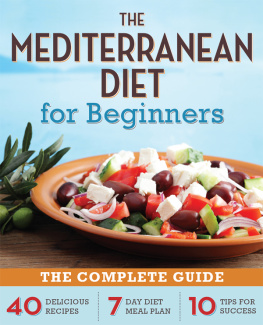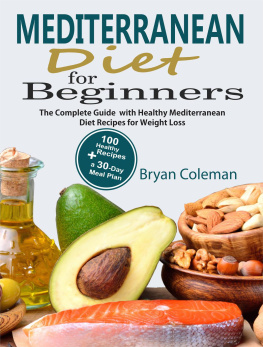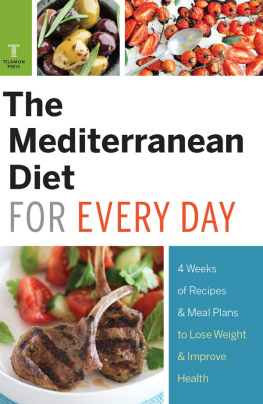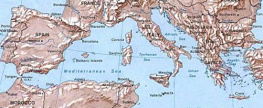INTRODUCTION
W hen most people think about the word diet, they think of deprivation and a lack of variety and excitement. With the Mediterranean diet, however, none of those characteristics apply.
The Mediterranean diet is filled with an almost unlimited assortment of fresh, delicious foods from all of the food groups. Although there is more of a focus on certain types of ingredients, none are excluded. People who eat a Mediterranean diet are able to enjoy the dishes they love, while also learning to appreciate how good the freshest, healthiest foods can be.
The Mediterranean diet is based primarily on the eating habits of people on the coasts of Italy, France, Morocco, Spain, and Greece. Because of their location and temperate climate, fresh vegetables, fruits, and seafood form the culinary foundation of these regions. You might think of eating the Mediterranean way as eating as though its summer year-round. It also might remind you of meals youve enjoyed while at the beach or on an island vacation. Obviously, the Mediterranean diet is far from dull.
Following the Mediterranean diet, youll not only enjoy fresh, delicious foods, youll also take pleasure in knowing that you are feeding your body what is widely acknowledged as one of the healthiest diets on earth.
When eating well tastes like a yearlong vacation, its easy and exciting to do.

UNDERSTANDING THE MEDITERRANEAN DIET
T he Mediterranean diet has received a lot of media attention over the last few years, and for all the right reasons. The Mayo Clinic calls it the heart-healthy diet, and its considered to be among the most nutritious diets on the planet. Describing it as a nutritional model that has remained constant over time and space, UNESCO recognized the Mediterranean diet as the Intangible Cultural Heritage of Spain, Italy, Greece, and Morocco in November 2010.
What Is the Mediterranean Diet?
Technically speaking, the Mediterranean diet is not a diet at allits a culinary tradition that focuses on fresh fruits and vegetables, whole grains, nuts, seafood, and olive oil, with the occasional glass of red wine. Its also part of a culture that appreciates and respects the freshest ingredients, simply prepared, and shares meals with friends and family in a leisurely and social way.
Everyone understands the importance of eating a well-balanced diet for better health and longevity, but very few people actually put it into practice. With most of our time being spent at work, we tend to look for quick and easy options when it comes to meals. These may include fast food, processed foods, and frozen dinners from the supermarket.
The Mediterranean diet is based on a simple premise: eat fresh, whole foods, in season. Over the years, many around the world have stopped eating seasonally because we can now get all kinds of produce year-round. Whats more, making meals from scratch seems to require too much time out of our already overburdened schedules. As a result, our diets are full of processed foods, artificial ingredients, refined flour, unhealthful fats, and sugar.
The Mediterranean diet is simple and straightforward: eat less meat and more fish (especially those that have a high concentration of omega-3 fatty acids, which improve metabolism and help lower cholesterol and blood pressure), cook with olive oil, and eat fresh fruits and vegetables and whole grains several times a day. The Mediterranean diet also includes a daily serving of nuts, which have a high concentration of good-for-you monounsaturated and polyunsaturated fats.
Unlike many popular diets, eating the Mediterranean way does not require eliminating fat from your diet. It doesnt limit your fat consumption at all, in fact. With the Mediterranean diet, you simply replace all of the bad fats you eat with good fats such as olive oil, nuts, seeds, and avocados. Some studies suggest that a moderate intake of red wine can help lower the risk of heart disease, and the Mediterranean diet encourages wine consumption (up to five ounces per day for women under the age of sixty-five and ten ounces for men under the age of sixty-five).
To sum up the Mediterranean diet:
Eat lots of fruits and vegetables
Buy seasonal, fresh produce from your local farmers market.
Go with whole grains
Replace foods made from white flour with whole-grain bread, cereal, and pasta. Include a variety of whole grains such as barley and millet, and choose brown rice over white.
Include a serving of nuts
Buy raw or roasted nuts such as almonds, cashews, and walnuts. (Walnuts are a rich source of omega-3 fatty acids.) Make nut butters at home or look for natural nut butters at your supermarket.
Replace the butter
Cook food in olive oil and use extra-virgin olive oil as a dip for breads and in salad dressings.
Use herbs and spices
Herbs and spices not only add a ton of flavor, allowing you to cut back on salt, but some also have antibacterial and anti-inflammatory properties.
Eat more fish
Salmon, sardines, anchovies, mackerel, and herring are some of the best sources of omega-3 fatty acids. Replace hamburgers and fried chicken with lightly sauted or broiled fish.
Cut back on red meat
Its a well-known fact that red meat contributes to higher cholesterol and blood pressure. Replace steak with lean meats such as grilled fish and poultry.
Buy low-fat dairy products
Make sure that the cheese, milk, and yogurt you buy are low-fat. Choose 1 percent or 2 percent milk instead of whole milk, and low-fat frozen yogurt instead of ice cream.
The History of the Mediterranean Diet
The Mediterranean diet is not tied to a particular country. In fact, each region (Southern Italy, Spain, Greece, Southern France, and Morocco) has a different version of the diet, depending on the local produce and availability of ingredients. Sara Baer-Sinnott, president of the non-profit Oldways, points out that certain similarities do exist, such as the heavy consumption of fruits, vegetables, and olive oil. Preparation methods in these countries have remained the same for centuriesfood is consumed fresh and is rarely deep-fried.
Dr. Ancel Keys first studied the Mediterranean diet when he was stationed in Salerno, Italy, in 1945. However, his work failed to garner attention until the fall of 1958, when Dr. Keys started his Seven Countries Study. This study examined the relationship between diet, lifestyle, stroke, and coronary heart disease in regions around the world. More than 12,000 men were enrolled in the study, which was conducted in seven countries in four regions (the United States, Southern Europe, Northern Europe, and Japan).
Data from the study indicated that deaths from coronary heart disease and stroke in the United States and Northern Europe greatly exceeded those in Southern Europe. Further research revealed a clear difference in the diet and lifestyle of these regions, information that eventually contributed to the popularity of the Mediterranean diet.
With the publication of several similar studies in the 1990s, the Mediterranean diet began to catch on in Western countries and has since become widely recognized as one of the healthiest in the world.
The Science behind the Mediterranean Diet
The model of most popular diet programs today is low fat, high protein. Not only is this model flawed, but it greatly limits the consumption of healthful fats, which the body needs to function properly. These healthful fats also serve to remove plaque buildup in arteries and keep the heart healthful by lowering the level of bad cholesterol.
















